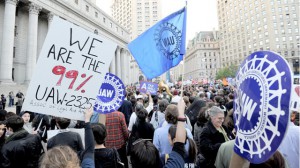“Occupy” Protesters Getting a Crash Course in the First Amendment
Whether you agree or disagree with the “Occupy Wall Street” protests that have been taking place around the U.S. for the last month or so, it’s hard to deny that they’ve become a bona fide political movement.
With any large protest movement (especially one that’s spontaneous and mostly leaderless), friction with law enforcement is inevitable. There have been a few high-profile reports of fairly severe clashes between police and protesters in a few places, but with protests occurring in dozens of large American cities, the general story seems to be that the protests have been largely peaceful, and the response of the police has been appropriately restrained, which is a credit to both groups.
And, as usual, the First Amendment is coming into play when the protesters do rub law enforcement the wrong way. In one of the First Amendment cases to arise out of the “Occupy” movement, the ACLU is representing (also reported here) members of Occupy Trenton, New Jersey in a case that raises some pretty interesting issues about free speech and freedom of assembly.
Essentially, the state is telling the protesters that they need to get rid of unattended signs, and stop using electric generators, arguing that the generators are a safety hazard, and the signs will simply turn into litter. On the other hand, the protesters are arguing that these demands are not based on any existing law, and that the authorities appear to be making up the rules as they go along.
 From a First Amendment standpoint, this is definitely suspect. While the Supreme Court has repeatedly held that reasonable restrictions on the time, place, and manner of public protests are permissible under the First Amendment, these restrictions have to be laid out in written rules, and only applicable after the laws are promulgated. And, of course, they have to apply equally to ALL protests, regardless of the subject matter or content of individual protests.
From a First Amendment standpoint, this is definitely suspect. While the Supreme Court has repeatedly held that reasonable restrictions on the time, place, and manner of public protests are permissible under the First Amendment, these restrictions have to be laid out in written rules, and only applicable after the laws are promulgated. And, of course, they have to apply equally to ALL protests, regardless of the subject matter or content of individual protests.
However, if the authorities are allowed to make up the rules as they go along, abuse of that power is almost guaranteed, effectively giving the police a license to censor speech that they don’t like, by inventing new rules to regulate protests on the spot. One of the core components of First Amendment law is that any restriction on speech must be unambiguous and narrowly-tailored to promote a legitimate public interest.
In this case, if there were already rules in place saying that protesters couldn’t litter and, for safety reasons, couldn’t use electric generators, these restrictions would probably pass constitutional muster, since they don’t tell protesters what they can and cannot say.
However, if it’s true that these rules did not exist in New Jersey, and the authorities are simply promulgating them to deal with a particular situation, then their actions are constitutionally-suspect.
I don’t know how this case will turn out, but I hope it brings attention to the fact that, no matter how annoyed or inconvenienced they may be, the authorities cannot make up new rules on the fly to regulate expressive conduct. It may be easier than drafting thoughtful, clear, and narrowly-tailored regulations on demonstrations that respect the right to free speech while protecting public peace and safety, but if the state wants to regulate demonstrations (and, as I’ve said, some regulations are perfectly reasonable), that’s what they’re going to have to do.

Comments